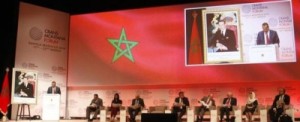
 The world needs to realize that there is no future without a cohesive, solidarity-based Africa standing tall and proud. The world needs to stop perceiving Africa as a vulnerable continent, but rather as a driver of progress.
The world needs to realize that there is no future without a cohesive, solidarity-based Africa standing tall and proud. The world needs to stop perceiving Africa as a vulnerable continent, but rather as a driver of progress.
The remarks came in the message King Mohammed VI sent Friday to the 27th session of the Crans Montana Forum, held in Dakhla, southern Morocco, under the topic “Africa & South-South Cooperation, towards a better Governance for a sustainable Economic and Social Development.”
“Today, it is high time Africa regained its rights vis-a-vis both history and geography: a rich history of African peoples united by centuries of exchanges and diverse ties, and geographical facts which show just how important it is to have integrated, complementary sub-regional groupings,” the King of Morocco said, insisting that Africa needs “to become a key partner in international cooperation mechanisms,” and “should no longer be perceived as a vulnerable continent, but rather as a driver of progress.”
He stated further that South-South cooperation is not an empty slogan, nor is it an appendix of development policies, one that is restricted to mere technical assistance.
“South-South cooperation is the result of a homogeneous strategic vision designed to promote the development of states and meet the needs of African populations. It revolves around the potential, skills and expertise of each one of the stakeholders concerned,” the Sovereign explained.
For this reason, he said, “Morocco has made South-South cooperation one of the pillars of its foreign policy as well as a determinant of its international action,” and “seeks – on its own as well as jointly with partners and sister nations – to implement concrete programs in targeted areas to achieve measurable outcomes in terms of growth and the well-being of the populations of the countries of the South in the economic, social, cultural, environmental and religious domains.”
The Sovereign expressed hope that this global conference will celebrate South-South cooperation for the preservation of the environment and will put Africa and all developing countries at the heart of the international agenda.
“Our overall objective is to make sure that the voice of a united, strong and determined Africa is heard and that it is heeded. I believe it is up to the international community to devise development patterns that ensure the well-being of people, while meeting the requirements of sustainability,” he said, urging States “to champion forward-looking plans and to strive to implement them through determined action and structural projects,” while involving citizens, civil societies and all stakeholders in in this sustainable development vision.
The sovereign also hailed the Forum’s decision to meet, once again, in the city of Dakhla, after its 2015 session, as bearing “witness to the fact that fresh momentum has been given to the vision we have of the Moroccan Sahara as a place conducive to interaction as well as a platform for time-honored human and commercial relations and for the exchange of knowledge between the South and the North.”
The Moroccan Sovereign pointed out in this vein that the new development model crafted for the Sahara region “is the result of a promising strategy through which we seek to bring our three southern provinces to a level of development that will enable them to fully play their role as an African economic hub and as a bridge between Europe, the Arab Maghreb the Sahel region.”
The 27th session of the Crans Montana Forum, an influential Swiss NGO working for the promotion of international cooperation and growth in the world, is attended by some 1,000 decision-makers, governmental officials and economic operators, from 131 countries and 27 regional and international organizations.
